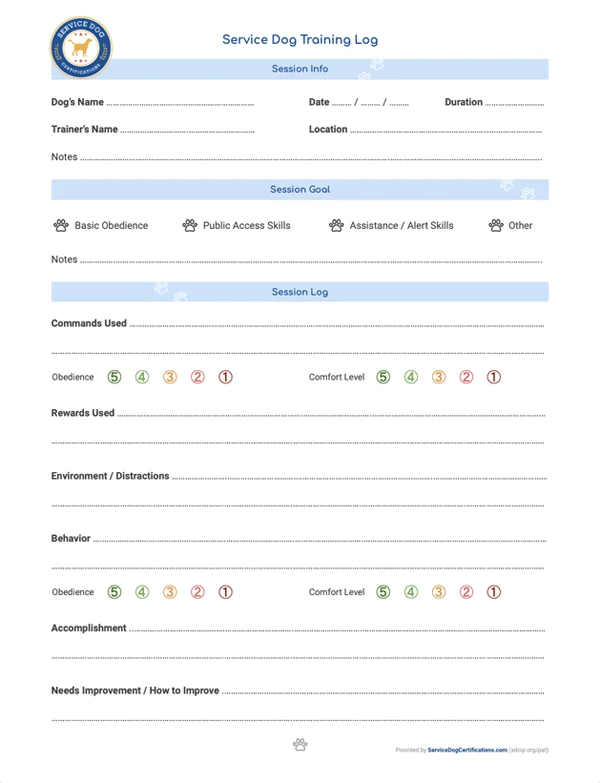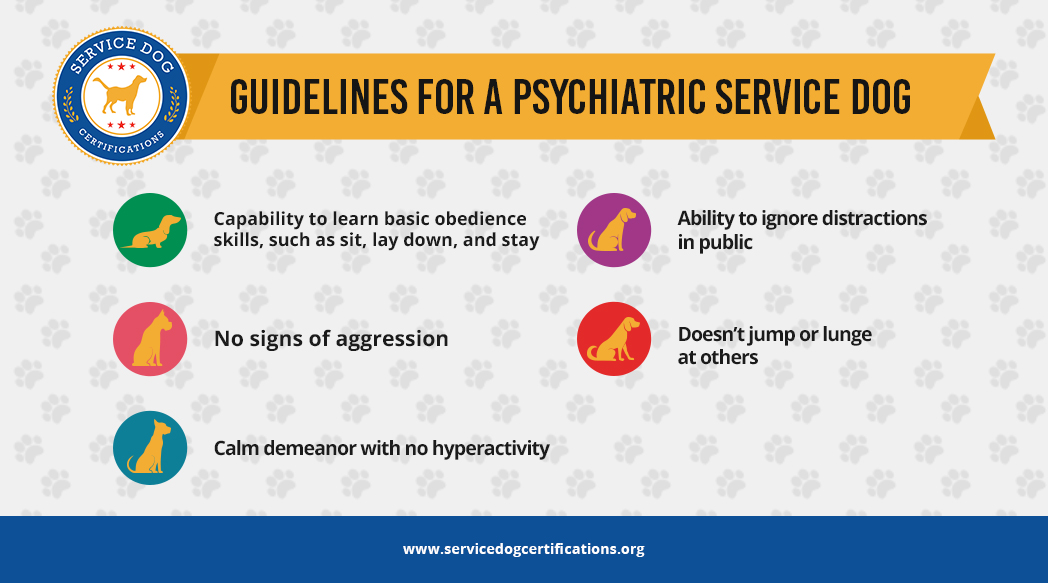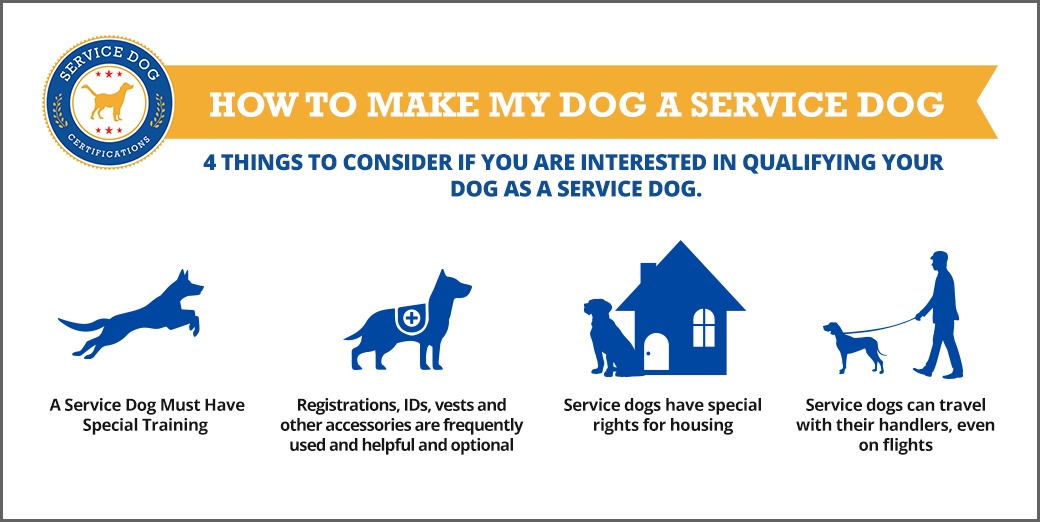Home Page › Blog › How to Get a Service Dog for Anxiety
How to Get a Service Dog for Anxiety

Research into the human-dog bond confirms how humans benefit from the relationship. Service dogs used to help with mental health conditions are also known as psychiatric service dogs (PSD) and utilize this human-dog bond. PSDs help fulfill tasks that individuals with severe anxiety would generally feel too overwhelmed to perform or can provide actions to prevent or reduce symptoms of anxiety as they occur.
Service Dogs for Anxiety
Anxiety is the most common mental health condition in the U.S., with approximately 40 million adults experiencing the disorder. Anxiety can become overwhelming and prevent a person from performing major life tasks. In cases where a person with anxiety is unable to function at work, school, or in social situations, a service dog can help them overcome their anxiety.
A service dog is a highly trained dog that can perform specified tasks or services that the individual with a disability may not be able to accomplish on their own. Service dogs are also legally allowed to follow their owners into establishments that are not usually open to animals.
Physiological and Psychological Response to Anxiety
Anxiety stems from a physiological response. The brain gauges situations as dangerous, even when they aren’t or if the danger has long gone. The brain then starts the stress reaction (a so-called “fight or flight” response) and releases hormones into the body. These hormones initiate the physical effects: hyper-awareness, rise in blood pressure, sweating, increase in heart rate, and quick breathing.
The physiological response from anxiety can be detrimental to the body if experienced for lengthened periods. This response can also result in a state of panic that prevents a person from executing necessary activities. Anxiety can also cause insomnia, depression, and anger management issues.
Research has shown that trained psychiatric service dogs can help humans overcome anxiety in several ways:
- Lower blood pressure and heart rate
- Provide a calming influence
- Function as a protective factor against suicide and self-harm
- Provide a sense of security
- Fetch any medication or devices that may help reduce the symptoms
It is important however to recognize that in order to qualify as a service dog, there must be a need for the dog to perform a job or task relating to a person’s disability. If the dog is merely providing comfort for anxiety that qualifies as a disability, it is likely an emotional support animal and not a psychiatric service dog.
Anxiety as a Disability
According to the Americans with Disability Act (ADA), a person with a disability meets one or more of the following criteria:
- A physical or mental impairment that severely impacts the ability to perform one or more major life functions
- A past impairment that meets the previous description
- Is regarded by others as having an impairment that meets this description
Many disabilities are not visible to others, meaning that the disability may not be readily apparent, like a physical impairment or injury. Many disabilities are neurological or psychological and can’t immediately be deducted.
Anxiety can be an example of one of these “invisible disabilities.” If anxiety causes impairment in a major life function such as work, school, or personal relationships, then may meet the definition of a disability.
Some forms of anxiety can be very debilitating. Phobias and obsessive-compulsive disorders are a form of anxiety. Phobias often prevent people from completing necessary life tasks such as traveling, being in public areas, or having social interactions. In these cases, because it impacts major life activities, anxiety may meet ADA’s definition of a disability.
A healthcare provider can help someone determine if their anxiety rises to the level of a disability. In addition, it’s worth repeating that even if a person has an anxiety disorder that qualifies as a disability, a psychiatric service dog is only appropriate if they need a job or task performed to assist with that disability. If task-trained dog is not required, it is more appropriate to seek qualification for an emotional support animal.
Wonder if you qualify for a Psychiatric Service Dog?
Get an assessment from a licensed medical health professional. If you qualify, they can issue a PSD Letter so that you can confidently train and own a PSD.
How can a service dog be obtained for anxiety?
Only dogs can legally be considered service animals and meet ADA requirements to enter areas with their owners.
The following are two qualifications to establish before getting a service dog:
- The level of anxiety must qualify as a disability: A service dog can be obtained for anxiety if the condition is an impairment that substantially limits one or more major life activities.
- Establishing a need for a service dog: A service dog must also be able to provide a task that the person with anxiety is unable to do. The dog must be able to perform a task that directly relates to the stated disability.
A licensed mental health professional or medical doctor can provide an assessment regarding whether a person’s anxiety is a disability. If deemed a disability, a PSD letter can be issued. Even though the PSD letter is not required to get a service dog for anxiety, many individuals with anxiety find it reassuring to have a letter from a licensed therapist that confirms their need for a psychiatric service dog.
Getting a service dog for anxiety can be a long process. There are PSDs that are already trained to be service dogs, but there may be a waitlist for such dogs. And even after receiving the service dog, further training alongside the handler may be necessary in order to make the dog sensitive to their specific handler’s needs.
Handlers can also select an untrained dog and conduct all the necessary training themselves. The ADA allows for self-training of service animals. Either way, it will take time and patience until the psychiatric service dog is fully trained and ready for duty.
 | Keeping a training log will help with analyzing the progress of your service dog’s training. Download this free sample Service Dog Training Log, provided by Service Dog Certifications. |
Service Dog Owner Responsibilities
Being a service dog handler comes with many responsibilities. Because service dogs can accompany their handler in public places where pets are not allowed to go, the handler must be comfortable and confident that their dog will behave at all times. The service dog must be able to focus on their tasks at all times, even in unfamiliar and busy places. If the handler loses control of their service dog, or the dog appears like a danger to other members of the public, it may lead to the removal of the dog. Service dog owners must ensure that their animals are safe, clean and well provided for at all times.
Conclusion
Obtaining a psychiatric service dog for anxiety is possible, though it may take time and patience until a suitable dog is fully ready for their job. But for all the benefits and possibly life-changing qualities a service dog for anxiety provides, it can be well worth the effort! If you think a service dog is appropriate for your psychiatric condition, speak to a licensed healthcare professional to see if you have a qualifying disability as a first step.
See if your mental or emotional disability qualifies for a psychiatric assistance dog. Get a PSD Letter assessment from a licensed medical professional.

About the Author: The writing team at Service Dog Certifications is made up of folks who really know their stuff when it comes to disability laws and assistance animals. Many of our writers and editors have service dogs themselves and share insights from their own experiences. All of us have a passion for disability rights and animals.
12 comments
Leave a Reply Cancel reply
Latest Posts

How to Bring a Service Dog to Disneyland
Trained service dogs are more than welcome to join their handlers at Disneyland. In this guide, we’ll explain Disneyland’s policies and give practical advice for bringing a service dog to Disneyland for the first time. Disneyland’s Service Dog Policies The Magic Kingdom is happy to welcome trained service dogs across most park locations! They kindly […]

Read More

Can Dogs Eat Tomatoes?
Yes! Dogs can safely enjoy tomatoes, but there are a few risks to be aware of so you can feed your dog responsibly. Fully ripe tomatoes (without the stems and leaves) can actually have nutrients that are good for your pup. Tomatoes have chlorogenic acid, an antioxidant that can have anti-inflammatory effects in cells. They’re […]

Read More

Can a Primary Care Doctor Write an ESA Letter?
Your family doctor, also called a primary care physician (PCP), can write a letter recommending an emotional support animal. We’ll explain what legally gives them that ability and explore what better options might be available for you. Why are Physicians Able to Write an ESA Letter? To turn your pet into an emotional support animal, […]

Read More








I suffer from physical and mental problems since I was a child, I was diagnosed with ADHD chronic anxiety bi polar and early stage dementia as well as depression that is severe that makes me stay in bed sometimes for a couple days and I loose appetite also, I have seizures since I was three years old I have a dog that needs to be trained. She’s very calm. She stays right next to me at all times, and when I cry, she licks my face and it makes me happy and my mood changes is there a way you can help me get her trained I can’t SSI and SSD for my mental and physical I lost my husband in 2019 and I just lost my dad January 16, 2023 so I have had a very hard life on top of all my depression and everything I am a diabetic as well
We’re sorry to hear about the difficult times you have been through. Unfortunately we do not at the moment offer training referrals. We wish you the best of luck in your search however. Once your dog is fully trained as a service animal we would be happy to assist you with our products.
I suffer from severe anxiety, especially when leaving the home, in public areas. I break out in sweats and cannot function properly. I have a dog that sticks by my side and comforts me when I have a breakout (sweating, not able to think straight, anger/anxiety/fear starts forming). Once, my dog comes to my side my anxiety and anger/fear starts going away and my dog relieves all of this! I would love to see what Title (service, emotional, etc.) she would qualify for and how I can obtain a letter. She is partially trained already.
Also, I have a history of seizures and had a stroke previously! All of this sweating, anxiety, fear, angry came after having these health conditions.
Please let me know?
Thanks
If your dog provides comfort for your anxiety just by its presence, it may qualify as an emotional support animal. You can read more about ESA letters here: https://www.servicedogcertifications.org/how-to-get-an-emotional-support-dog-letter/
To qualify for a service dog, your anxiety must constitute a disability that requires the use of a task trained service dog to assist with that disability.
Yes my question is I rent a house I’ve got diabetes anxiety depression I currently see a psychiatrist and I’m in the process of getting a puppy she’s 2-3 months she’s a bichon so when I went to ask my land if I could have an emotional support dog they said I had to pay a pet deposit plus they would raise my rent every month the guy that’s trying to help me get this puppy was nice a copied off a form showing she was a service dog my landlord thinks if u have a service dog that’s when u don’t pay a fee so I need to find out what to do to cover me from getting evicted
Both emotional support animals and service dogs are exempt from pet fees and deposits under HUD guidelines. In addition, ESAs are not the same as service dogs. If you are an ESA owner, you should never try to pass of your assistance animal as service dogs. Both have rights when it comes to housing.
I’m manic bi polar who also suffers from a high anxiety level most of the time not all the time. I do have a ESA . I would love to get her trained and certified as a PSD. With me being bi polar and having depression and anxiety would my conditions be likely permitted to have a PSD?
If you qualified for an emotional support animal there is a good chance you have a qualifying condition, since in both cases you need a mental or emotional health disability. However, to have a PSD, you must also have a disability related need for a task trained dog. We think you will find this post helpful: https://www.servicedogcertifications.org/psychiatric-service-dog/
I Have a Certified Therapy Dog ( Trained 13 lb Toy Australian Shepard ) & Were a Therapy Team , Bringing Joy & Happiness To Others and Most Of All She Brings Well Being In My Life, As I’m Disabled Person With Anxiety and Depression . I’m Moving Soon , Into a Apartment Building and They Require a Large Non Refundable Pet Deposit and Monthly Pet Rent. I Would like to have This NR Deposit Waived . I DesireTo Have Her Become a P.S.D. Dog , But I’m Unsure What I Need To Do Next On This Matter. I Just Want To Make Sure It’s Legit And Legal With This Process . I Hope Yu Can Help Us With This ?
Both emotional support animals and service dogs are exempt from pet fees. Therapy dogs however do not have housing rights. To qualify for an emotional support animal, you would need a letter from a licensed healthcare professional to show your landlord. You can find out more about ESA letters at this link: https://www.servicedogcertifications.org/how-to-get-an-emotional-support-dog-letter/
Hi I need more information on how to get a psychiatric support dog. I do currently have a small chihuahua, I really think I’d benefit from a bigger dog such as a labador retriever. I recently I have started having stress induced seizures and I’m having difficulty controlling anger and moods. I would benefit from a dog redirecting me when I’m getting upset or emotional. I’d benefit from the company he give as my current dog is a loner. I will get letter from Dr what is next step who do I call?
You do not need a letter from a doctor for a service dog, although doctors can be helpful to determine whether you have a qualifying disability and can provide documentation such as a PSD letter. You may find it helpful to speak to a professional trainer about your needs if you do not have experience training service dogs. Please see this post for more information on PSDs: https://www.servicedogcertifications.org/psychiatric-service-dog/